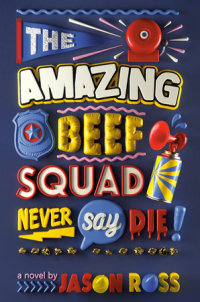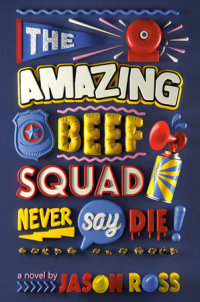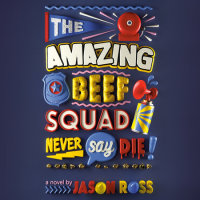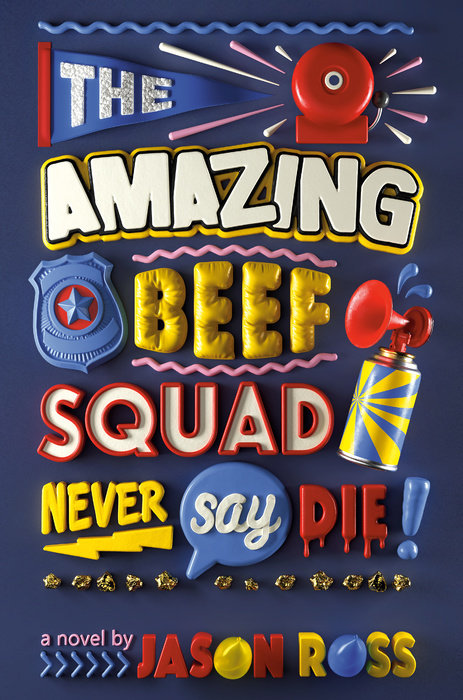The Amazing Beef Squad: Never Say Die!
Author Jason Ross



The Amazing Beef Squad: Never Say Die!
"Juvenile delinquency has never been so fun!” —Jon Stewart, comedian, filmmaker, television host
Meet the Beef Squad: a group of unforgettable kids who are serious about pranks but also about doing whatever it takes to help the people and places they care about.
Nick Rhodes and his friends Pratchett, Hogue, and Jared--together known as Beef Squad--have got seventh grade totally hacked. They make perfect grades by day, pull spectacular pranks by night, play video games in between, and do it all with a zany sense of humor only they find funny. (Because someone has to celebrate National Asparagus Appreciation Day.) But seventh grade is about to strike back! Trouble at school and a secret from their town's Gold Rush past put Beef Squad on a collision course with Leonardville's most powerful forces. Now, with the help of robotics teammate Karla Woo, they decide to reveal what's going on, no matter the consequences.
This laugh-out-loud story about a group of truly "amazing" and strongminded kids is one middle-grade readers will cheer for.
An Excerpt fromThe Amazing Beef Squad: Never Say Die!
Chapter 1
To look at Pratchett, you wouldn’t think he’s strong.
Legs like breadsticks. Arms like the rolled baloney his mom packs in his lunch every school day. His neck juts forward so when he runs through Birdwell Park he looks like a demented turkey. He does not appear to represent MVP material, is what I’m saying. But for reasons none of the PE teachers at Lyndon B. Johnson Middle School can figure out, Pratchett’s left arm is a Gettysburg cannon.
I mean, our friend throws heat.
That’s how Hogue ended up squirming on the grass late on a cloudy Monday afternoon in April, clutching his most sensitive parts.
“I’m sorry!” Pratchett shouted, his own hands clamped down in the dark bramble of his hair. “I didn’t think it would work!”
“What wouldn’t work--the ball?” Hogue hissed, glaring at the softball at his side. He held on to his valuables as if someone were coming to steal them.
Stupidball games always ended badly.
Last time me and my three friends Hogue, Jared, and Pratchett played it, we took out a yellow baby stroller.
Chapter 1
To look at Pratchett, you wouldn’t think he’s strong.
Legs like breadsticks. Arms like the rolled baloney his mom packs in his lunch every school day. His neck juts forward so when he runs through Birdwell Park he looks like a demented turkey. He does not appear to represent MVP material, is what I’m saying. But for reasons none of the PE teachers at Lyndon B. Johnson Middle School can figure out, Pratchett’s left arm is a Gettysburg cannon.
I mean, our friend throws heat.
That’s how Hogue ended up squirming on the grass late on a cloudy Monday afternoon in April, clutching his most sensitive parts.
“I’m sorry!” Pratchett shouted, his own hands clamped down in the dark bramble of his hair. “I didn’t think it would work!”
“What wouldn’t work--the ball?” Hogue hissed, glaring at the softball at his side. He held on to his valuables as if someone were coming to steal them.
Stupidball games always ended badly.
Last time me and my three friends Hogue, Jared, and Pratchett played it, we took out a yellow baby stroller. Luckily the baby wasn’t in it, because the stroller did a complete one-and-a-half somersault and landed upside-down, one wheel rolling in the air. The mom rushed to the scene in a few long steps, leaving her baby dangling in the swing.
“What are you boys even doing?” she shrieked. “Why were you running backwards?”
“Because the score’s tied,” Pratchett had said, wiping stray blades of grass from his face. Pratchett loved to explain things, especially to grown-ups. “See, if there’s a tie at the six-minute mark we have a backwards sprint from the big tree to the trash can.” Pratchett pointed out these important field markers as he spoke. “And the loser has to do cartwheels--not roundoffs--”
“I don’t care!” the mom shouted, cutting him off.
“Then why’d you ask?” Hogue said.
The time before that, the Birdwell Park groundskeeper turned on the sprinklers right when Jared and I were starting the extra-point bicycle joust. A jet of water shot into my left eye and I veered into a pile of gravel that was sitting there for some reason.
You can add the groundskeeper to the list of people I’m pretty sure don’t like us.
This time it was Hogue and his unfortunate package.
“You okay?” I asked, putting a hand on Hogue’s shoulder. I hated seeing him this way. Hogue’s clowning skills were legendary. He could turn anything into a laugh. Mr. Easton, our science teacher, once called him “the funniest kid I’ve ever been this annoyed at.”
Hogue pushed himself to his feet.
He shouted in an impossibly high falsetto: “I feel great!”
He chirped it out like a squeaky balloon, shoving a fist in the air for punctuation. Now Hogue was standing while the rest of Beef Squad (that’s our name--I’ll explain later) writhed on the grass in laughter.
Stupidball never ended well, but whatever disaster it led to was usually hilarious.
Hogue wasn’t done.
“I’m ready to take on the world!” he peeped. “Nothing’s gonna keep me down, ya hear? I’m going straight to the top, buster! Next stop, the big time!”
He held the goalkeeper’s tennis racquet up in triumph, like the gold guy on top of a trophy. My tears were soaking the grass with dangerous levels of saline when a much lower voice boomed from the parking lot.
“Hey, look! It’s Butt Squad!”
Scott Dekker had found us.
He rolled silently across the grass toward us. As usual, Roger Denton and Eric Bullock huffed along on foot behind him.
If we didn’t already hate Scott Dekker for treating us like insects he could squish at will, we would have to hate him for his electric minibike. It was so sweet, so fast, and so illegal.
“What are you Butt Squadders doing?” he said. “Getting romantic with the gophers? They’re probably the only thing you’ll get with.”
Scott Dekker wasn’t wearing his Oakland A’s baseball cap that evening, but his hair was dented all around the hatband line, waiting for its return. His eyes were the color of a lime Popsicle melted onto asphalt. His ears and neck were pastrami red, like he’d been running to keep up with himself. At his collar I could see the tips of the spider’s front legs--the only real tattoo at our school.
With one sneakered foot he pushed out the kickstand and then rose from the bike’s streamlined seat. By now my friends and I were on our feet, facing Scott’s crew in a loose nonformation. It was a staggered arrangement ensuring that, should violence erupt, our numerical advantage would be utterly wasted. Not that I was expecting a fight.
This encounter would be about humiliation.
“Look at you guys,” Scott said. “My gecko takes more substantial craps than you.”
“You have a gecko?” Hogue asked.
“From the Maldives,” Scott Dekker said. “We went there for Christmas.”
“Does he talk like the one on TV?” Hogue said.
“Yeah, he says ‘Beef Squad drools,’ ” Scott said.
Hogue walked right into that one.
Scott stepped forward between Roger and Eric to complete a powerful-looking three-man front. He must have known it was working, because he stood there for, by my count, six heartbeats. And that was his mistake.
As middle schoolers, we walk a very fine line. We must be cool, but we musn’t try too hard. I guess Scott was enjoying the moment so completely he forgot to act like it was no big deal. And now he and his two minions were posing like total jackasses.
They must have realized it at the same time. They tried to break up their arrangement, which was a good idea, except that all three of them made a simultaneous turn to their left and now stood looking at us over their right shoulders.
It looked like a dance move.
“Wow, are you guys a boy band?” a voice said, surprising me.
The voice was mine.
At least, everyone seemed to think it was. My friends, mindful of Scott Dekker’s violent temper, tried to keep their laughs to a respectful bellow, but I heard Hogue’s cackle echoing off the bathrooms across the field, so I guess they didn’t do a great job.
It was a pretty savage own, because Scott Dekker couldn’t think of anything to say. Instead he punched me as hard as he could in the abdomen. I saw him coming and tried to turn away, but that just gave him a clear shot to my kidney. Suddenly I was down on one knee, staring at Scott’s left sneaker and waiting for air to return to my lungs. I feel safe assuming that, above my head, Scott was back to striking an impressive pose.
The sneaker turned and exited my field of view. I sipped just enough air to allow myself to stand and watch Scott plop his butt down on his minibike.
“You guys are the boy band,” Scott said, pushing back the kickstand.
“Yeah. Sing a song to your gopher lovers,” Eric said.
Scott Dekker’s head snapped toward his smaller friend.
“Shut up!” he said.
Eric blinked a few times and didn’t make another sound. If you haven’t figured it out yet, Scott Dekker is a real credit to the human race.
“Well, have fun in the park, Butt Squad,” he said. “My dad’s about to tear it all up.”
He twisted the throttle and the minibike’s back wheel spun on the grass for a second before catching. He whirred back the way he came. Roger and Eric loped behind him, but the joyous spring in Eric’s step was gone. Roger looked back over his shoulder.
“Butt Squad!” he shouted, just as Pratchett fired the softball in their direction. It cut a high arc through the sky but thudded onto the grass a couple yards short of Roger. He picked up the ball.
“Thanks!” he shouted, and left. With our ball.
They had slipped from view down First Avenue when Officer Jim rolled up in his white cruiser. He just drove across the grass like it was no big deal, elbow sticking out the window.
“Just in time,” Jared said sarcastically when his car slowed to a stop.
Officer Jim pushed the shifter up into park. The engine’s rumble changed into a higher-pitched whine. He swiped the mirrored shades off his face and gave us a big smile. His teeth matched the car’s paint job. No one I knew smiled more than our town’s youth services officer. He reminded me of a golden retriever: cheerful, optimistic, but not entirely smart enough to realize when the screen door is closed.
“What’d I miss, chief?” Officer Jim said.
“Just Scott Dekker being a toxic bully,” Pratchett said.
The smile wrinkled into a worried look. “You boys not get along with Scott?” he said. “I could always set up an encounter session after school, let you talk out your differences in a safe space.”
“Our differences are that he punches us,” Hogue said. “That’s it. That’s our differences.”
“Hmm,” Officer Jim said. “I’m getting some negative vibes here. Remember, boys, winners never whine--”
“And whiners never win,” we all droned in unison
“Hey! You remembered!” Officer Jim said.
“Uh, yeah,” Jared said. “You’ve said it like a thousand times.”
“I know,” Officer Jim said. “I just can’t help getting a case of the feels. I’ll see what I can do about Scott.” He put his sunglasses back on and pulled down the shifter. The engine clunked into gear like it had swallowed something and the cruiser started rolling away.
“Talk soon, chief,” he said, making a pistol out of his finger and thumb.
“Which one of us is chief?” Hogue said when he was gone.
“Me, obviously,” Jared said.
“I think we all are,” Pratchett said.
“Nice try,” Jared said. “There can’t be more than one chief. That would defeat the whole point of having a chief.”
We were unlocking our bikes from the tennis-court fence when Hogue brought up Scott Dekker’s parting words.
“Do you think that’s true?” he asked. “Why would they tear up a park?”
Scott Dekker’s father owned the Placid Meadow Construction Company, so he definitely had a bulldozer. But Birdwell Park had been here for generations. Everyone knew the sad story of Abraham Birdwell. It was on a plaque over by the basketball court. He never married and had no heirs, so he left his ten acres as a gift to the city.
“It’s BS,” Jared said. “That kid’s so full of BS it’s coming out his stupid red ears.” Just talking about Scott Dekker got Jared so riled that he had red ears, too.
Hogue shrugged. “Personally, I wouldn’t mind,” he said. “No more park? No more Swimming Pool Contract.”
Chapter 2
Now, to recap, the Swimming Pool Contract was the only reason we were in the park to begin with.
It started nine months ago. We were all in Jared’s pool innocently playing Death Squid Versus Machine-Gun Shark. (It’s a slightly more sophisticated game than Stupidball, revolving entirely around the battle to control the pool cleaner’s two sweeper hoses.) And that should’ve been the end of it: four friends enjoying the simple pleasure of scouring out each other’s eye sockets with high-pressure chlorinated water.
But while we dove and gasped, kicked and coughed, elbowed and heaved, our parents were up on the patio drinking pink wine and hatching a plan to ruin our lives.
The Swimming Pool Contract decrees we have to play in the park for an hour every day. Even if a dark cloud rolls over McConnell Butte and rains a biblical torrent of frogs onto our heads. Even if it’s zero degrees and snowing nuclear sleet all over Leonardville. Even if the sun goes red giant and scorches the valley into a glassy crust of pure silicon, we must play in the park. We have no say, no leverage, no choice in the matter.
Because if we don’t play outside, then we can’t play video games.
I know--it’s pretty much child abuse. And yet I have to respect the clever way our parents did it. They knew that if any family had tried to pull such an evil scheme alone, they never could have won. If my parents had told me, “No video games before exercise!” I could simply have gone over to Jared’s house, or to Hogue’s house, or even to Pratchett’s dad’s apartment, which smells like the litter box of the world’s sickest cat but also has a sweet 65-inch 4K TV.
But together, they formed an alliance too strong for us to crack.
“I can’t believe we let it happen!” Jared said that night as we huddled on his front lawn, shivering and slapping mosquitos. “We were fifteen feet away the whole time!”
“They’re grown-ups,” Pratchett said through chattering teeth. “What could we do?”
He squashed a wooly insect on his ankle.
“Anything!” Jared said. “Splash them, whip them with foam noodles, squirt them with pool cleaner. I don’t care! We just needed to break up their little soiree!”
Jared’s anger was slow to arrive, but once it was on the scene he was a different kid entirely. I called him Mad Jared. Mad Jared’s eyes seemed to glow from some internal fire. Mad Jared talked more than regular Jared, with a noticeably larger vocabulary. It was like he needed more words to communicate the depth of his fury.
“If we’d splashed them, they just would’ve moved inside,” Pratchett said.
“Then we could have started punching each other in the face!” Mad Jared said. “I could’ve driven the lawn mower off the diving board! If we all had bloody lips and black eyes, the party would have been over! You all would have had to go home and everything would still be awesome!”
The rest of us looked at each other.
“Except for the bloody lips and black eyes,” Hogue said.
“And stumps,” I said.
“A small price to pay!” Mad Jared said. “Now there’s nothing we can do. It’s a fait accompli.”
See what I mean about his vocabulary?
“Actually,” Pratchett said, whipping out his phone, “we could take them to federal court on antitrust charges.”
Pratchett was always saying “actually,” followed by something no other kid in middle school could possibly know.
“Oh, yes!” Hogue said. “Whatever that is, let’s please do that! You guys will love the courthouse.”
But Pratchett was already shaking his head, thumb-scrolling through a law-review article with one hand while waving away bloodsuckers with the other.
“Actually, I take that back,” he said. “I’m pretty sure we lack standing.”
That sounded bad, whatever it meant.
So began the SPC era. If nothing else, I like to think it’s proven the high moral character of its victims--us. We have shown perfectly good form throughout the ordeal.
There was one act of defiance, but in the end nothing happened. A month after the infamous pool party, Hogue sprained his ankle in an early game of Stupidball and placed a call to Child Protective Services complaining of parental cruelty. But the matter was quickly cleared up after a series of eleven home visits by social workers led to a hearing before a judge, who ordered psychiatric evaluations of both of Hogue’s parents, which were entered into evidence for another hearing before another judge, who postponed the first three hearing dates because--everyone said--he’d gotten a great deal on a vacation trip to Zihuatanejo, but who eventually heard Hogue’s complaint and read the reports and ruled that Hogue’s parents were probably normal, kind people, but just in case they were sociopathic liars who had fooled the system, Hogue’s house would remain subject to random, unannounced inspection by social workers, police, and sheriff’s deputies for a period not to exceed six years.
